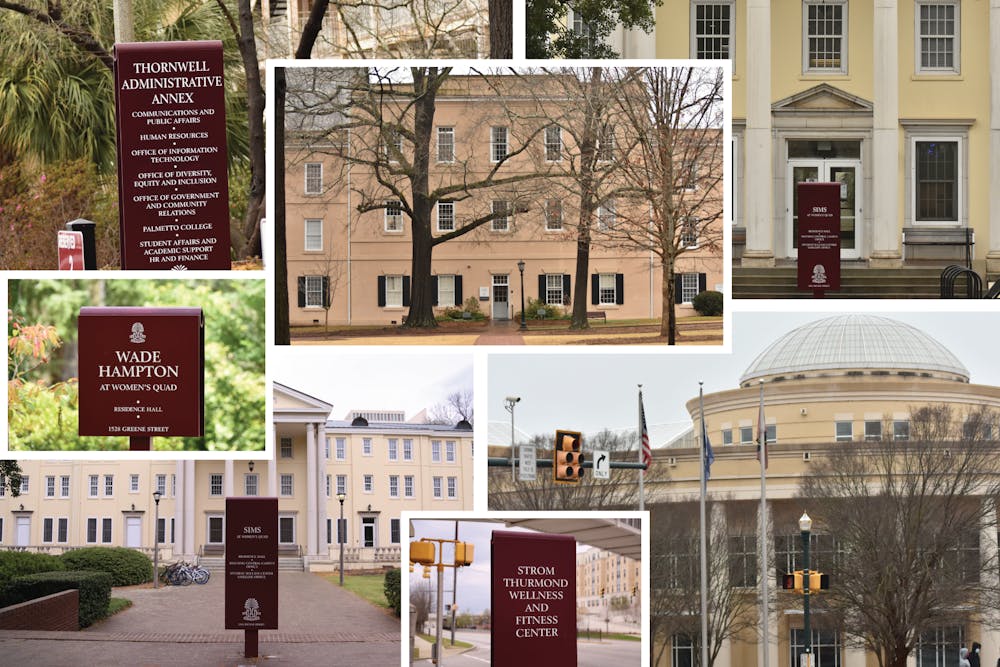The Presidential Commission on University History is slated to issue a report reevaluating building names on campus to university President Bob Caslen by June.
Caslen and the board of trustees will decide whether or not to take the report to the state legislature. The state legislature normally adjourns in May, so it would not vote on renaming buildings until it goes back into session in 2022. The state legislature has to vote on changes to any names of monuments or historical places in South Carolina because of the Heritage Act.
The Association of African American Students issued a statement emphasizing the importance of pushing for the renaming of buildings at USC.
"We will not be complacent in the progress that has been made, but instead we will continue to strive for change," the statement said.
Student Body President Issy Rushton and Vice President Hannah White, who are also members of the commission, published a letter published on Feb. 8 expressing their “deep frustration and disappointment in the lack of progress” made by the commission.
This sentiment was shared by other members of the commission.
“Absolutely, I would like us to move faster; there’s no question about that. Everyone on the commission would like us to move faster,” David Snyder, a USC history professor and member of the commission, said.
Commission members agreed that deliberate research takes time.
"This is something that, we want to be very careful in our research and deliberative, and unfortunately, that does take time. This is not something that could be done in its entirety in a year," Elizabeth West, university archivist at the South Caroliniana Library, said.
Snyder said many of the members on the commission are just learning this history for the first time. He said he believes figures such as Wade Hampton and Jonathan Maxcy are relatively obscure to most people and even a fair amount of historians.
Due to the commission's size and desire to be democratic, deliberations and votes also tend to slow things down, Snyder said.
President of the NAACP chapter at USC, Caley Bright, said the lack of effective communication between the commission and students also appears to be a sizable reason for the disconnect.
"From my perspective, and a lot of other students' perspective, it's just like they're sitting ducks in a boardroom not doing anything," Bright, a first-year criminology and criminal justice student, said.
Bright said many students did not know about opportunities to contribute to commission meetings and the public listening sessions that were held in the fall. Former university President Harris Pastides, the commission's co-chair, said the only reason the meetings were "closed in sense" was because people didn't show.
"I think that if we had more of a liaison between the commission and the students, then that would definitely help with the frustrations of the students not knowing what is going on," Bright said.
First-year political science student and vice president of USC's NAACP chapter Krishna Alexander echoed Bright's feelings on communication between the commission and students.
"Lack of communication is a big part of the issue; no matter if we understand that these people in power and that their heart may be in the right place, but with your heart being in the right place, we also need to see that as a reflection in the actions that are taking place," Alexander said.
Despite the slow progress by the commission, Alexander said she remained hopeful.
"Right now, it's just about being optimistic," Alexander said.
The Heritage Act has yet to play a role in the commission's work up to this point. The commission's goal is simply to make recommendations for name changes. It is up to Caslen and the state legislature to work out an actual change, Pastides said.
However, to Bright, just seeing those recommendations would go a long way in reassuring her on the commission's earnestness.
"I would like to see a resolution and maybe recommendations for new names, so we can see where their head is at," Bright said. "That would honestly satisfy me."

